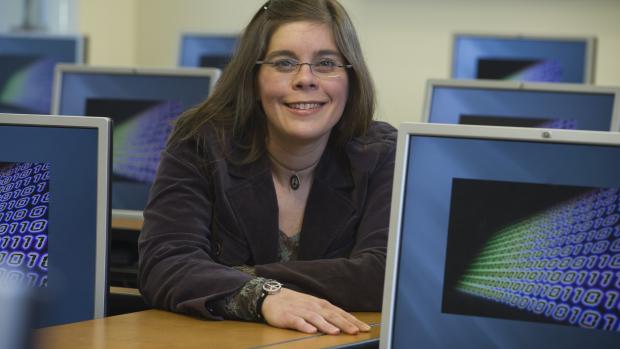Protectress of the Wild West: A Profile of Suzanna Schmeelk

You've probably missed her on campus.
Between teaching online courses for the University of Maryland, volunteering at Weill Cornell Medical Hospital and working at LGS Innovations, Suzanna Schmeelk has been a scarce figure of late at the Polytechnic Institute of New York University (NYU-Poly), where she's pursuing a master's degree in technology management.
Don't let the low profile, easygoing, first-year student fool you, though. She's no less than one of the nation's top five influential thinkers in cybersecurity, according to SC Magazine, an information-security publication that recognized Schmeelk alongside John Steufert, chief information security officer for the U.S. Department of State, and Peter "Mudge" Zatko, a program manager at the Defense Advanced Research Projects Agency who gave a keynote address at the CSAW competition at NYU-Poly last semester.
Schmeelk was the only woman on the list, but she shies away from discussing the gender disparities in the heavily male-dominated information-security field. "I'm reluctant to talk about it because I don't like to make anything a crutch," she explains, "but I do think we need to change the current system."
Testing Limits
It's her opening gambit to an impassioned critique of STEM (science, technology, engineering and mathematics) education in this country, where women graduate with a disproportionately low number of undergraduate degrees in the STEM disciplines, according to a 2011 report from the Economics and Statistics Administration. "So much of the teaching is still geared towards testing," Schmeelk says, "And testing only gets you so far."
She refines her point by citing an example of what she calls "procedural thinking," walking through the simple math problem of adding 10 to 13. Schmeelk's fingers pantomime in the air, mimicking the way students might approach the problem. "People say it's three, no ones to carry, and then two," she says. "It's a procedure from right to left, but there's [more than one] way to add 10 to 13. You can say 10 and 10 is 20, then three. You can break 13 into [a series of] ones, and then put 10 into ones, and then count them all up."
For Schmeelk, the value of doing things differently can't be overemphasized. "Innovation comes from mistakes as well as successes," she says. "We tend as a society to focus only on success, but Thomas Edison is well-known for saying that most of his mistakes [became] patented. A lot of mistakes turn into something."
Schmeelk's views are informed in part by her doctoral degree in mathematics education from Rutgers University, as well as her bachelor's and master's degrees in computer science.
The highly educated professional hasn't spent her entire career in academia, however. She's also worked in industry, with stints at eBay and Yahoo, and is now considering extending her studies at NYU-Poly to pursue a PhD in technology management. Schmeelk isn't yet sure what she might focus on at the doctoral level but believes her master's thesis will likely be related to health care and technology.
Taming the Wild West
"Health care records need to be stored correctly," she says, zeroing her concern on quality assurance. "I like protecting people."
"A lot of this technology is just being thrown out there," Schmeelk continues. "We have a food and drug administration to protect our food and drugs, but we don't really have a cybersecurity administration." Perhaps recalling the National Cyber Security Division of the Department of Homeland Security, she admits that there's some protection at the government level, but it's geared towards bureaucrats, not consumers and the technology marketed to them.
"There are very few laws out there protecting people and their information. Anything can go," Schmeelk says. "It's still the Wild West, if you will."
Helping corral her thoughts on the subject are Dr. Joseph Nadan, who teaches in NYU-Poly's department of Technology Management, and William Hery, a professor in the department of Computer Science and Engineering. Schmeelk is effusive in her admiration of the two men—"[Nadan] is such a big-picture thinker" and, about Hery, the single adjective "amazing"—but extends her praise to the departments as whole not just for the content of their offerings, but for the delivery of that content: Courses may be taken online or in a live classroom. "It's very well thought-out," Schmeelk says. "It's pretty obvious."
Schmeelk was first exposed to NYU-Poly through its online courses but thinks she'll be spending more time at the Brooklyn campus in the months ahead. Fans of the blossoming cybersecurity star might begin seeing more of her around NYU-Poly; for those struggling early in their cybersecurity careers, Schmeelk has some choice advice: Find support through a professional association or group. "A lot of the time, it's not even there yet," she admits before smiling and saying, "So start one. Keep moving forward. When you start letting people change your vision, that's when you start getting in trouble."




